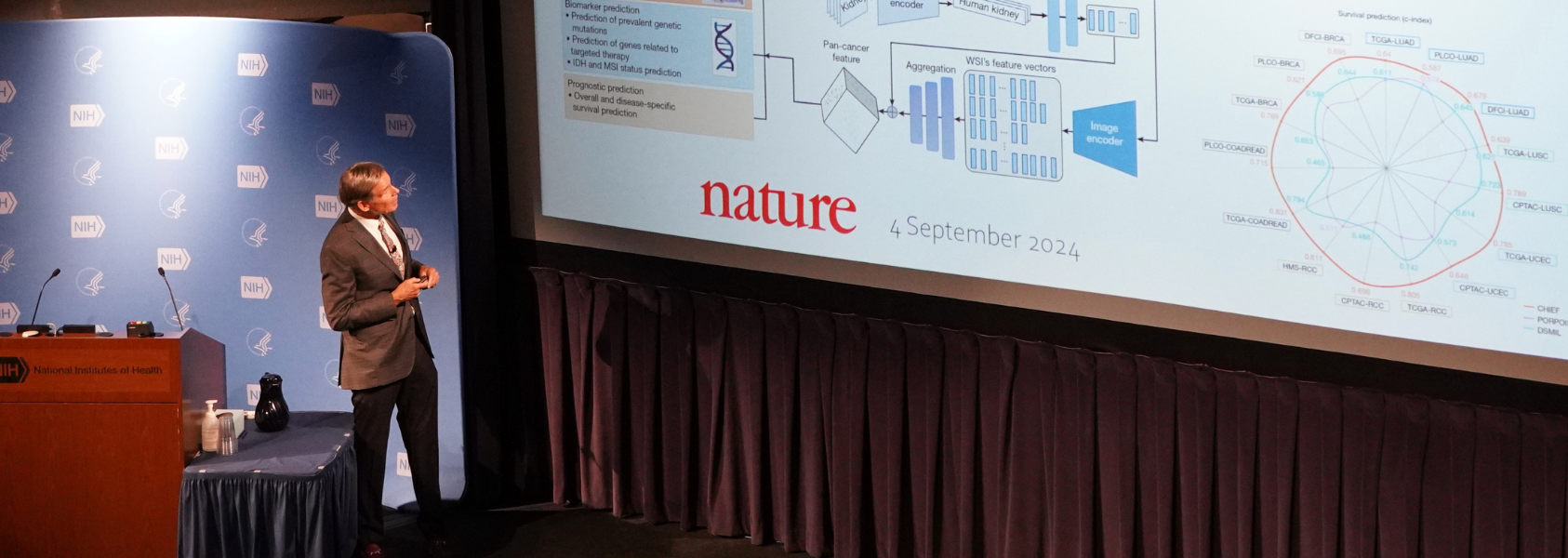Pioneering physician-scientist discussed extraordinary advances in AI and medicine during recent NIH Clinical Center Grand Rounds guest lecture
 Dr. Eric Topol spoke about the promise and perils of AI in health and medicine at the NIH Clinical Center while presenting a Grand Rounds Contemporary Clinical Researchers Great Teachers guest lecture .
Dr. Eric Topol spoke about the promise and perils of AI in health and medicine at the NIH Clinical Center while presenting a Grand Rounds Contemporary Clinical Researchers Great Teachers guest lecture .
Humanity is on the cusp of “the most exciting time in medicine” owing to extraordinary advances in artificial intelligence (AI) and near-future applications.
So argues Dr. Eric Topol, a pioneering cardiologist and thought leader in the use of digital, genomic and AI tools to promote human health.
One of the most cited researchers in medicine, Topol is the executive director of Scripps Research, a world leader in translational biomedical research.
The physician-scientist spoke about the promise and perils of AI in health and medicine at the NIH Clinical Center while presenting a Grand Rounds Contemporary Clinical Researchers Great Teachers guest lecture on Sept. 11, 2024.
Created to inspire young clinician- investigators in the pursuit of careers in biomedical research, the special lecture series invites thought leaders in medicine and science to present on topics and ideas they are passionate about.
In an hour-long talk, Topol surveyed the latest research into artificial intelligence, highlighting areas where its application is profoundly advancing the practice of medicine, including reducing medical error and improving diagnostics, risk-screening and the doctor-patient relationship.
Topol noted a 2023 study by Johns Hopkins researchers, which estimated that 800,000 Americans each year are seriously disabled or die from incorrect medical diagnoses.
Research has shown that using AI models to interpret medical scans dramatically reduces diagnostic errors, especially when supporting a clinician. Topol pointed to numerous studies confirming that AI “machine” or “digital eyes” have higher pickup rates for lung cancers, breast cancers, colon cancers, and other diseases.
He noted that AI models can even detect many serious conditions before noticeable symptoms appears. “The machine will see things that humans will never see,” Topol said. “It’s just extraordinary and this is why the hope for improving accuracy is so rich.”
For example, using simple retina scans of the eye, AI systems can now accurately diagnose a pandora’s box of serious health conditions, including high blood pressure, prediabetes, kidney disease, liver and gall bladder disease, Alzheimer’s disease, stroke and heart attack risk, lipdemia, hyperlipidemia and Parkinson’s disease, Topol noted.
For patients with Alzheimer’s, the AI model was able to correctly diagnose the disease seven years before symptoms appeared. In Parkinson’s patients, AI detected the disease five years before symptoms occurred.
During his talk, Topol heralded the advent of powerful new transformer AI models, such as ChatGPT and Google Deep Mind, which can learn on their own and do not require medical data annotated by experts to train.
When applied to cancer detection, the resulting AI foundational model can not only identify cancerous cells in pathology slides but identify the genetic mutation driving the cancer and provide a prognosis for the patient.
Transformer models are also highly effective at difficult diagnosis, Topol noted, citing the extraordinary case of a Michigan boy who suffered from an unknown disease despite consulting 17 doctors.
The boy’s mother entered all her son’s symptoms, which included escalating pain, stunted growth, a dragging left foot, headaches, and more, into ChatGPT, which correctly diagnosed occult spina bifida.
Surgeons released the boy’s trapped spinal cord, and he was cured. Topol cited a recent study of a Google Deep Mind large language model used in a clinical setting, which evaluated 26 variables—from diagnostic accuracy to exam skills to patient-centered communication and empathy.
Publishing their results in the journal Nature, researchers found the large language model scored better than the physician. “Google AI has better bedside manner than you doctors,” Topol told audience members.
Topol shared his belief that AI systems will increasingly be used to serially evaluate layers of data over the course of patients’ lives, assessing everything from their DNA and RNA, to their anatomy, physiology, epigenomics, microbiome, metabolome and exposome. “[We] have the ability to predict and forecast things in medicine at the individual level that we never had before,” he said.
AI will be especially useful in revamping medical screening and approaches to age-related diseases, such as heart disease, cancer and Alzheimer’s.
When applied to Alzheimer’s “AI can tell us when this is likely to show up and also set up the intervention to prevent this from ever happening,” Topol said.
The physician-scientist said he is particularly hopeful that AI will free clinicians from the outsize burden of computer time to document patient notes, schedule tests and request insurance preauthorization.
“The gift of time from AI” will allow doctors to spend more time with their patients and restore the doctor- patient relationship, he said.
—Sean Markey
Watch the Grand Rounds Lecture: videocast.nih.gov/watch=55082

